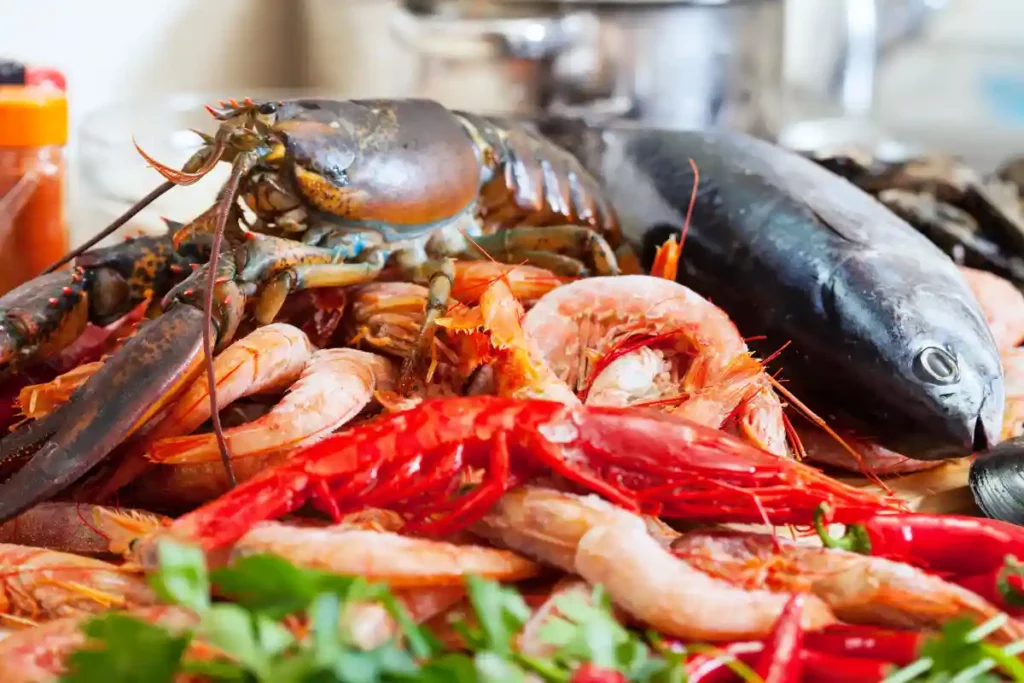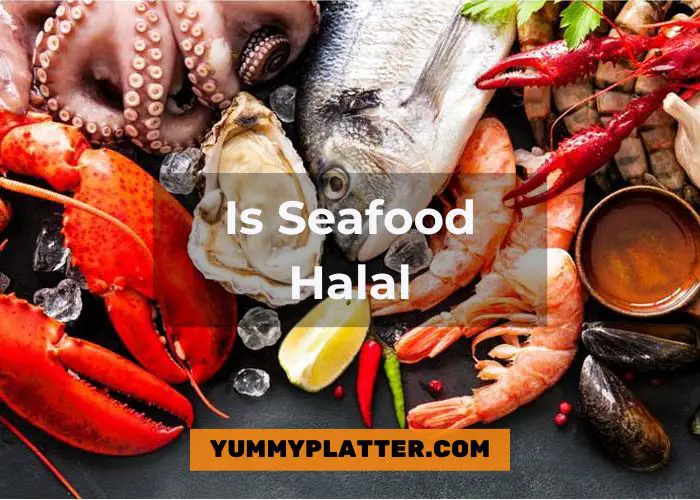Welcome to our exploration of whether seafood is halal! If you’re curious about Islamic dietary laws, you’ve come to the right place. Halal food is crucial for Muslims around the world. It follows specific guidelines set by Islamic law. Today, we’re diving into an interesting question: “Is seafood halal?”
Understanding what makes food halal or not is essential for Muslims. But it’s also fascinating for anyone interested in different cultural practices. Seafood, with its vast variety and nutritional benefits, sparks curiosity. Can Muslims enjoy all types of seafood? Are there exceptions?
Join us as we unravel the mysteries of halal seafood. We’ll look at what Islamic texts say and how different interpretations affect what’s considered halal. Whether you’re a Muslim wanting to adhere to your dietary laws or simply curious, this guide is for you. Let’s dive in and discover the world of halal seafood together!
Delving Into Halal: The Basics
Halal food isn’t just a dietary choice; it’s a way of life for Muslims. “Halal” means permissible in Arabic, and it guides every aspect of a Muslim’s diet. But what makes food halal? It’s all about following Islamic law closely.
For food to be halal, it must meet specific criteria. First off, the source of the food must be permissible. This means no pork or alcohol, as both are clearly forbidden. But there’s more to it than just avoiding certain foods. The way an animal is slaughtered plays a huge role. It must be done in the name of Allah, ensuring a swift and humane process. This practice respects the animal and is a key part of making meat halal.
But halal goes beyond just meat. It’s about purity and ethics in all food handling. From preparation to packaging, every step must avoid contamination with anything considered haram, or forbidden. Even the utensils used matter. If they’ve touched haram substances without proper cleaning, the food can’t be halal.
The intention behind the food matters, too. It’s not just about following rules mechanically. A Muslim must intend to eat halal food for the sake of obeying Islamic laws. This intention sets halal eating apart as an act of faith.
So, is seafood halal? The short answer is yes, generally. Most Islamic scholars agree that seafood is naturally permissible. But, as we’ll explore, there are nuances and exceptions depending on different interpretations.
Seafood through the Lens of Islamic Law
When it comes to Islamic dietary laws, seafood holds a special place. Most Islamic scholars agree: seafood is halal. This means Muslims can enjoy a wide variety of sea creatures without worry. But, as with many aspects of life, the details matter. Let’s dive into what makes seafood halal and where some differences in opinion pop up.
Islamic law, based on the Quran and Hadith, generally gives seafood the green light. The Quran doesn’t explicitly forbid any type of seafood. This opens up a sea of possibilities for Muslims to enjoy fish, shrimp, and more. It’s pretty straightforward: if it lives in the sea, it’s halal.
However, not all Islamic schools of thought agree on every detail. For example, the Hanafi school is a bit stricter. They say that only fish are definitely halal. This means they’re cautious about shellfish. On the other hand, the Shafi’i, Maliki, and Hanbali schools are more inclusive. They welcome all types of seafood, shellfish included, into the halal category.
Why the difference? It all comes down to interpretation. Islamic scholars study the texts and apply their understanding to modern life. The Hanafi School’s caution reflects a specific interpretation of Islamic law. Meanwhile, the other schools interpret the texts as being more permissive about seafood.
Despite these differences, the common thread is clear: seafood is largely halal. This consensus makes seafood a fantastic option for Muslims around the world. Whether it’s fish, shrimp, or even squid, there’s a good chance it’s permissible to eat.
The Wholesome Goodness of Seafood
Seafood isn’t just delicious; it’s packed with health benefits that make it a superfood in many diets, including halal ones. Let’s break down why seafood is such a healthy choice and how it can boost your well-being.
First up, omega-3 fatty acids. These are the stars of the seafood show. Omega-3s are essential fats your body can’t make by itself. They’re known for improving heart health, reducing inflammation, and even boosting brain function. Fish like salmon, mackerel, and sardines are loaded with these good fats.

Next, let’s talk vitamins and minerals. Seafood is a treasure trove of nutrients. Vitamin D, which is hard to find in food, shines brightly in fish. It’s crucial for bone health and immune function. Then there’s iodine, found in abundance in seafood, essential for thyroid health. And let’s not forget about protein. Seafood provides high-quality protein that’s easier on the stomach than some heavy meats.
But it’s not all about what seafood adds; it’s also about what it lacks. Generally, seafood is lower in unhealthy fats and calories compared to red meat. This makes it a heart-healthy choice that can help maintain a balanced diet and weight.
Of course, like anything, moderation is key. Some seafood can contain mercury and other pollutants. The trick is to choose a variety of seafood types, favoring those with lower mercury levels, like shrimp, salmon, and catfish.
Incorporating seafood into your diet can have big health benefits. Whether you’re enjoying a grilled salmon steak or a bowl of shrimp curry, you’re doing your body a favor. And for Muslims, knowing that seafood is halal adds an extra layer of satisfaction to these nutritious meals.
Also Read: Is Kosher Gelatin Halal?
Exploring Halal Certification for Seafood in the USA and UK
When it comes to choosing seafood in the USA and UK, halal certification takes the guesswork out of grocery shopping. Let’s dive into what halal certification means for seafood and how it can guide you, whether you’re in the USA or across the pond in the UK.
Halal certification is like a seal of approval. It tells you that a product meets Islamic dietary guidelines. For seafood, this means it’s been sourced and processed according to halal standards. This reassurance is crucial for Muslims who want to stay true to their dietary laws.
In the USA, halal certification comes from various organizations. They inspect seafood suppliers and their products to ensure everything is halal from start to finish. This includes checking how the seafood is caught, handled, and even packaged. When you see a halal label on seafood in the USA, you know it’s passed a thorough check.
The UK follows a similar path. With a diverse Muslim population, the demand for halal-certified products is high. UK certification bodies do their homework, ensuring that seafood not only meets halal standards but also complies with local food safety regulations. This double layer of scrutiny means you can trust the halal label on your seafood.
But why look for halal certification if most seafood is halal by default? It’s all about peace of mind. Certification removes any doubt about cross-contamination with non-halal products. Plus, it supports Muslim businesses and organizations that go the extra mile to uphold Islamic dietary laws.
Finding halal-certified seafood in the USA and UK is becoming easier. Supermarkets and specialty stores are expanding their halal sections due to growing demand. And with online shopping, halal-certified seafood is just a click away, no matter where you are.
Seafood Choices: Ethical and Green Reflections
Choosing seafood isn’t just about taste or even health; it’s also about making ethical and environmentally friendly decisions. Let’s chat about how your seafood choices can reflect care for our planet and its inhabitants.
Ethical eating means thinking about where your seafood comes from. It’s about choosing suppliers who treat workers fairly and fish responsibly. This approach respects both people and marine life. By picking ethically sourced seafood, you’re voting for fairness with your fork.
Environmental considerations are huge, too. Our oceans are under stress from overfishing and pollution. But you can make a difference! Opting for sustainable seafood helps protect ocean life. Look for certifications like the Marine Stewardship Council (MSC) in the USA and UK. These labels mean your seafood comes from sources that keep our oceans healthy and full of life.
Sustainable seafood isn’t just about the species you choose; it’s also about how it’s caught or farmed. Methods that harm the environment or catch too many fish at once are a no-go. Instead, support practices that maintain fish populations and minimize damage to marine ecosystems.
Remember, every choice counts. Choosing seafood with care shows you’re thinking about the future of our planet and its people. It’s a way to enjoy the ocean’s bounty while helping ensure it remains vibrant and diverse for generations to come.
FAQs
Is all seafood considered halal?
Yes, most Islamic scholars agree that seafood is generally halal and permissible to eat according to Islamic law. This includes fish, shellfish, and other sea creatures. However, some schools of thought, like the Hanafi School, have specific restrictions, particularly regarding shellfish.
Do I need to find halal-certified seafood?
While seafood is generally considered halal, looking for halal certification can provide additional assurance, especially regarding cross-contamination with haram substances during processing or packaging. It’s particularly recommended when buying processed seafood products.
Can Muslims eat seafood from any restaurant?
Muslims can eat seafood from most restaurants, but it’s important to ensure that the seafood is not prepared or cooked with haram ingredients (like alcohol or pork products). Asking about cooking methods and ingredients used can help make an informed decision.
Conclusion: Your Seafood, Your Choice
So, there you have it! We’ve journeyed through the world of halal seafood, touching on its health benefits, ethical considerations, and how to ensure it’s halal-certified, especially for folks in the USA and UK. Now, it’s time to wrap up our seafood saga.
Remember, seafood is a fantastic choice for anyone looking to eat healthily and ethically. It’s packed with nutrients and, for the most part, it’s halal-friendly. But knowing is just half the battle. Making informed choices is where it really counts.
Look for that halal certification when shopping. It’s your guarantee that you’re sticking to your dietary beliefs. And don’t forget about the planet. Opting for ethically sourced and environmentally sustainable seafood helps protect our oceans and their inhabitants. You’ve got the knowledge now. Whether it’s picking the right fish, understanding halal standards, or making choices that are kind to our earth, it’s all in your hands. Your seafood choices can reflect your care for your health, your faith, and your world.










Leave a reply